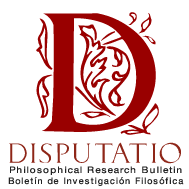Robert B. Brandom
University of Pittsburgh, United States of America | rbrandom@pitt.edu
Received: 27-January-2018 | Accepted: 3-March-2018 | Published: 30-June-2019
Disputatio [Jun. 2019], Vol. 8, No. 9, pp. 00-00 | DOI: 10.5281/zenodo.2631339
Article | [EN] | Full Text | Statistics | Copyright Notice [es] | Vol. 8 No. 9
How to cite this article:
Brandom, Robert B. (2019). «Some Strands of Wittgenstein’s Normative Pragmatism, and Some Strains of his Semantic Nihilism». Disputatio. Philosophical Research Bulletin 8, no. 9: pp. 00-00.
Abstract | In this reflection I address one of the critical questions this monograph is about: How to justify proposing yet another semantic theory in the light of Wittgenstein’s strong warnings against it. I see two clear motives for Wittgenstein’s semantic nihilism. The first one is the view that philosophical problems arise from postulating hypothetical entities such as ‘meanings’. To dissolve the philosophical problems rather than create new ones, Wittgenstein suggests substituting ‘meaning’ with ‘use’ and avoiding scientism in philosophy together with the urge to penetrate in one’s investigation to unobservable depths. I believe this first motive constitutes only a weak motive for Wittgenstein’s quietism, because there are substantial differences between empirical theories in natural sciences and semantic theories in philosophy that leave Wittgenstein’s assimilation of both open to criticism. But Wittgenstein is right, on the second motive, that given the dynamic character of linguistic practice, the classical project of semantic theory is a disease that can be removed or ameliorated only by heeding the advice to replace concern with meaning by concern with use. On my view, this does not preclude, however, a different kind of theoretical approach to meaning that avoids the pitfalls of the Procrustean enterprise Wittgenstein complained about.
Keywords | Meaning and Use · Hypothetical Entities · Antiscientism · Semantic Nihilism · Linguistic Dynamism.
![]()
Algunas vertientes del pragmatismo normativo de Wittgenstein y algunas tensiones de su nihilismo semántico
Resumen | En esta reflexión me ocupo de una de las preguntas claves que son el tema de esta investigación sobre Wittgenstein y Brandom: ¿cómo justificar proponer aún otra teoría semántica a la luz de las fuertes advertencias contrarias de Wittgenstein? Veo dos motivos claros para el nihilismo semántico de Wittgenstein. El primero es el punto de vista de que los problemas filosóficos surgen al postular entidades hipotéticas como ‘significados’. Para disolver los problemas filosóficos en lugar de crear nuevos, Wittgenstein sugiere reemplazar ‘significado’ con ‘uso’ y evitar el cientifismo en la filosofía junto con el impulso de penetrar en las investigaciones de uno a las profundidades no observables. Yo pienso que este motivo para el quietismo de Wittgenstein es débil, porque hay diferencias sustanciales entre las teorías empíricas en las ciencias naturales y teorías semánticas en la filosofía que dejan que la asimilación wittgensteiniana de unas a otras sea vulnerable a objeciones. Wittgenstein tiene razón, sin embargo, en cuanto al segundo motivo, que ante el carácter dinámico de la praxis lingüística “el proyecto clásico de una teoría semántica es una enfermedad que… se puede superar o aliviar haciendo caso al consejo de reemplazar la preocupación con el significado por la preocupación con el uso.” Esto no impide en mi opinión, sin embargo, un planteamiento al significado que evita las trampas de la procústea empresa de la que se quejaba Wittgenstein.
Palabras Clave | Significado y uso · Entidades hipotéticas · Anticienticismo · Nihilismo semántico · Dinamismo lingüístico.
References
Brandom, Robert B. (2011). “From German Idealism to American Pragmatism –and Back.” In: Perspectives on Pragmatism. Cambridge, MA: Harvard University Press.
Brandom, Robert B. (2008). Between Saying and Doing: Towards an Analytic Pragmatism. Oxford: Oxford University Press. doi: https://doi.org/10.7202/039727ar
Brandom, Robert B. (2015). From Empiricism to Expressivism: Brandom Reads Sellars. Cambridge, MA: Harvard University Press. doi: https://doi.org/10.4159/harvard.9780674735569
Peirce, C. S. (1992 and 1999). The Essential Peirce (two volumes edited by the Peirce edition project). Bloomington: Indiana University Press.
Quine, Willard van Orman (1951). “Two dogmas of empiricism”, reprinted in Quine: From a Logical Point of View. Cambridge, MA: Harvard University Press. pp. 20–46. doi: https://doi.org/10.2307/2273406
Schneider, Hans Julius (2013) Wittgenstein’s Later Theory of Meaning: Imagination and Calculation. London: Wiley–Blackwell.
Sellars, Wilfrid (1997). Empiricism and the Philosophy of Mind. Cambridge, MA.: Harvard University Press.
Sellars, Wilfrid (1958). “Counterfactuals, Dispositions, and the Causal Modalities” in Minnesota Studies in the Philosophy of Science, Volume II: Concepts, Theories, and the Mind–Body Problem, edited by Herbert Feigl, Michael Scriven, and Grover Maxwell. Minneapolis: University of Minnesota Press. pp. 225–308, §79. doi: https://doi.org/10.2307/2270811
Stanley, Jason (2013). Know How. Oxford: Oxford University Press.
Wilson, Mark (2006). Wandering Significance. Oxford: Oxford University Press.
Wittgensgtein, Ludwigc(1961). Tractatus Logico Philosophicus. London: Routledge & Kegan Paul.
Wittgensgtein, Ludwig (1953). Philosophical Investigations. Translation by G. E. M. Anscombe. Oxford: Basil Blackwell.
© The author(s) 2019. This work, published by Disputatio [www.disputatio.eu], is an Open Access article distributed under the terms of the Creative Commons License [BY–NC–ND]. The copy, distribution and public communication of this work will be according to the copyright notice. For inquiries and permissions, please email: boletin@disputatio.eu.
